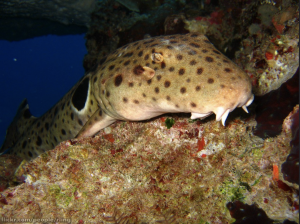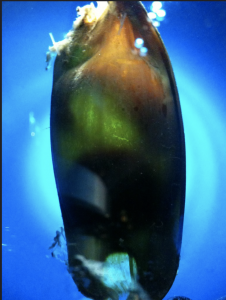Sharks are considered the lions of the sea, but due to climate change they are losing their glory. With global warming causing the rise of ocean temperatures, one particularly tough and beautiful species, the epaulette shark, sometimes referred to as the walking shark, may be heading towards disaster.
The epaulette shark is typically 70 – 90 cm in length and has dark spots running up and down its slender body. This shark notably has a large black circle outlined in white on each of its sides. It lives in the Great Barrier Reef in Australia and finds its food in shallow puddles between the coral. This shallow environment is dangerous; leaving most fish stranded out of the water, left to die under the hot sun. This amazing animal is not so easily defeated and is able to conserve its breath and march back towards the sea. The impressive survival mechanisms of the epaulette shark are shown and described in the video below created by PBS in 2017.
Video Source: Nature on PBS| Youtube
The epaulette shark has proven itself to be resilient in low oxygen environments. Previous experiments even found that their eggs and newborns are tolerant to ocean acidification. Regardless of this resilience, rising temperatures still pose a serious threat, especially to its offspring.
A new study carried out by Ph.D. candidate Carolyn Wheeler on the eggs of epaulette sharks, showed that increasing ocean temperatures significantly affect the development of its young. The researchers analyzed the growth of epaulette shark embryos until they hatched, at temperatures of 27°C, 29°C, and 31°C . It was found that the embryos grew faster at the higher temperatures, as in the warmer water the sharks tended to consume their yolk-sacks quicker, which is their only source of food before they hatch. This in turn caused them to hatch sooner, and due to the reduced time in their embryos, they were born smaller and lacking in energy. The newborns which hatched at higher temperatures struggled to survive and needed to eat significantly sooner after birth compared to those at 27°C. Other studies have additionally observed, that at 32°C the likelihood of epaulette shark eggs hatching becomes very low.
The average temperature of the Great Barrier Reef is currently at 28°C during the period of embryo development in the wild, but with climate models predicting that average temperatures in this region will rise to 32°C by the middle or end of the century these animals are in trouble. As we explored earlier, epaulette sharks are known to be tolerant to acidic conditions and are more resilient than any other shark to low oxygen environments.
Since the increasing temperatures will likely have a detrimental impact on the epaulette shark – which is considered a tough and resilient species – we can only imagine the negative impacts it will have on other more vulnerable wildlife.
– Adam Soliman


